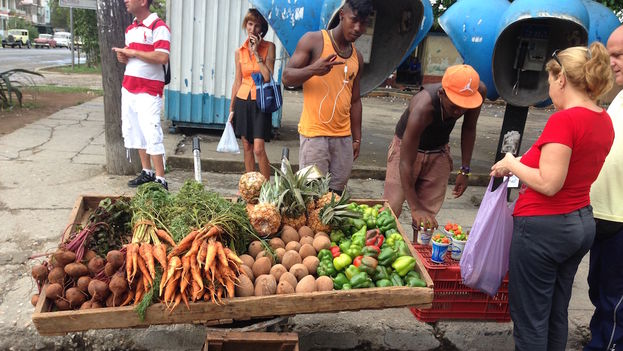
![]() 14ymedio, Yoani Sánchez, Havana, 13 April 2020 — He used the wheels to make a toy for his son, with the bottom boards he reinforced his sofa, and the iron frame now supports his home’s water tank. My neighbor Yunier, 38, dismantled the makeshift vehicle in which he was selling fruits and vegetables after the last official raid against pushcart vendors. Today, we are missing his wagon with tomatoes and onions.
14ymedio, Yoani Sánchez, Havana, 13 April 2020 — He used the wheels to make a toy for his son, with the bottom boards he reinforced his sofa, and the iron frame now supports his home’s water tank. My neighbor Yunier, 38, dismantled the makeshift vehicle in which he was selling fruits and vegetables after the last official raid against pushcart vendors. Today, we are missing his wagon with tomatoes and onions.
At a time when crowds and long lines are becoming a death trap in which the coronavirus gloats, the small merchant who was offering his wares through the neighborhoods is a painful memory of the limitations imposed by the authorities on a private sector that could now help supplying food to the population. In order to avoid these vendors “enriching” themselves, they have left entire neighborhoods without supplies.
So this Sunday I had to walk a very long distance — there is no longer public transportation, as the government has shut it down — to find some fruit and vegetables because in the closest state market the stands are almost empty. A small kiosk near Calzada del Cerro was my salvation but the seller warned me that he won’t be open this coming week. “I used to have a pushcart, but they confiscated it,” he tells me.
Every now and then there is an “enemy” which becomes the focus of official attacks. Once it was the artisans in the Plaza of the Cathedral, another time it was the ‘flowerpots’ as the new rich are called. The private farmers had their turn to the targets of a volley of insults; the “intermediaries” were demonized; and for a few years the target of the expletives have been the pushcart vendors. The official press accuses them of not respecting price caps, of wanting to profit from necessities and of buying cheap to resell high.
Scenes of merchandise seizures, hefty fines, and police assaults on these neighborhood merchants became frequent. The result: for each ten there used to be in Havana now there is only one and that in bad shape, and if five years ago one could go down to this corner or that and come back with garlic, peppers and plantains, now, it is only possible to purchase these products in the state or cooperatively managed markets with poorer supplies, lower prices and questionable quality.
My neighbor Yunier wants to retrieve the pieces to reassemble his rolling cart. He believes that, in the short term, spurred by the collapse of the economy and the need to decentralize the points of sale, the State will once again allow and encourage the small merchant. “I had many customers who were old people who could not move from their homes and bought from me at their doors. Now how do they manage?” he asks himself. But the carts don’t fill up on their own.
In the countryside, there are those who wait for an official decision authorizing the delivery of state lands and facilities to private individuals who will work them, as well as the elimination of high taxes; the eradication of that dysfunctional state apparatus known as Acopio, which only acts as a straitjacket for farmers; and the permitting of direct import of seeds and agricultural supplies. “We are waiting but they do not tell us anything,” a pig producer from Alquízar, who this week has sold his last animals, tells me. “We do not have food for them and so it cannot continue. Either they open things up or the hunger will be great.”
After talking to him, I devoted myself to meticulously washing some cachucha peppers that I got, along with some donkey bananas and some sweet potatoes. I peeled, cut and bagged the products that will allow me to feed the family in the coming days when supplies start to disappear from the streets.
See other posts in this series.
_______________
COLLABORATE WITH OUR WORK: In this time of Covid-19 crisis, 14ymedio could really use your help to keep the news coming. Please click on this link to support our work.
